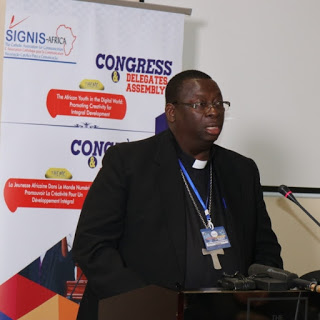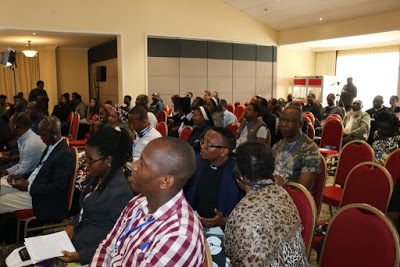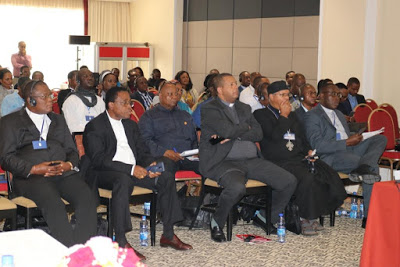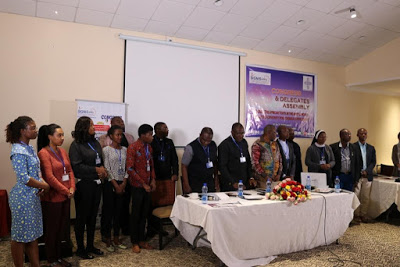ETHIOPIA: Understanding Why African Catholic Media Practitioners are not Active SIGNIS Members

Rt. Rev. Moses Hamungole, Bishop of Monze Diocese, Zambia and Chairman of Social Communications at Zambia Conference of Catholic Bishops (ZCCB)
Participation of African countries in SIGNIS (the World Catholic Association for Communication) affairs is known to be very minimal both in establishment and participation. It is an observation that many African countries only identify SIGNIS with communications project proposals that are sent to Propaganda Fides through the SIGNIS Secretariat.
AMECEA online News sought to establish the reason for this lack of vibrancy among the Catholic communicators despite the fact that the Catholic media apostolate is fast growing on the continent, including the AMECEA Region where the mass media and other modern means of communications are embraced as key to the Church’s evangelization purposes.
During the just concluded SIGNIS Africa Congress held in Addis Ababa, Ethiopia, AMECEA Online News interviewed Rt. Rev. Moses Hamungole, Bishop of Monze Zambia and Chairman of Social Communications Department at Zambia Conference of Catholic Bishops-ZCCB. Bishop Moses once served as President of SIGNIS Africa while he was working at the Radio Vatican. Until his appointment as Bishop of Monze in February 2014 he was also considered one of the most active members at the SIGNIS International Board level.
THE INTERVIEW
AMECEA Online: There is very minimal participation of AMECEA countries in SIGNIS activities, right from the national, continental up to the International levels. What, in your opinion is the problem?
Bishop Hamungole: I wouldn’t blame AMECEA countries per se or other African countries for not being active members of SIGNIS. All along, what people understood is that SIGNIS gives money for communication projects. SIGNIS comes from the background of UNDA (International Catholic Association for Radio and Television) and OCIC (International Catholic Organization for Cinema and Audio-visuals). OCIC was dealing with cinema and UNDA was dealing with the pastoral communications and the radio stations. So with the coming of many radio stations in Africa especially in AMECEA Region, SIGNIS became popular because they were giving financial support for for equipment and trainings for Catholic journalists. So, I think the presentation of SIGNIS as an Association of Catholic journalists, of people who are in the media, people who are in the field of communications was lost.

If you check for instance now, in many countries in Africa, the SIGNIS members are national communications coordinators or secretaries. As long as it remains like that, the national office which is also submitting its projects for funding from Propaganda Fides through SIGNIS to get money to run its programs, remains privileged. What is now becoming notable among our brothers from West Africa, especially in Nigeria and Ghana where the countries have managed to come up with a strong National Association, is about the vibrancy.

In Nigeria there is a very vibrant cinema production; there is also a vibrant communication set up in terms of television and radio stations. Although the Church may not own these entities, it does so through some individuals who can get a license to run a media outlet. These artists and communicators have come together, having seen the need to unite hence the formation of SIGNIS Nigeria. In AMECEA Region, the artists are still far away from the Church, nobody has really organized them to come together, to meet, to empower them and to tell them that you are SIGNIS members, it is your association that is the member of SIGNIS and not necessarily the National Office.
Until the AMECEA Region National Communications Coordinators or Secretaries begin to understand that their role is to facilitate the process of Catholic journalists who are in the field becoming members of SIGNIS, the trend will remain be the same.
Another reason why participation in SIGNIS activities is minimal even among the National Communication Coordinators or Secretaries who have ascribed to SIGNIS membership is that we are still tied to the old system of SIGNIS practices where members would have their tickets paid for by either 70% or 90% including their board and accommodation. The trend has changed due to unavailability of sufficient funds and therefore members are required to pay for their itineraries as well as take care of part of their accommodation expenses. This has proved to be an obstacle.
However, I feel encouraged by the ways the just concluded SIGNIS Africa Congress was conducted. The countries that really brought people were only three, Nigeria, Ghana and DRC Congo the rest of African countries were still shaky. But I would say that there is hope. At least a number of countries were represented even though they never brought many people. Those who managed to come catered for their travel expenses as well as paid registration fee of US $200 which catered for some of the expenses for the Congress. I would like to encourage more people especially from AMECEA countries to take the cue.
AMECEA Online News: What happens in situation where the national communications coordinators or secretaries have failed to mobilize the Catholic communicators to form the association, yet there may be certain vibrant Catholic media practitioners who feel left behind but would love to be members of SIGNIS. For instance, can Capuchin TV in Kenya or Luntha TV in Malawi or Radio Maria Malawi register for membership of SIGNIS if the national communications office has failed to bring them together under one umbrella Association for the country?
Bishop Hamungole: The first thing that is very paramount in this situation is to go back to the statutes of SIGNIS. It is very clear that membership of SIGNIS is to the Associations. Only where there is no Association like in most of the AMECEA Countries, the National communications office may become like a member. And even there, it is seen as an interim arrangement where whoever is the national coordinator of communications has to facilitate that process of moving from the national office to becoming a national SIGNIS association where members are at liberty to elect their president.
For instance, in Nigeria where a National Association (SIGNIS Nigeria) has been established, the president is not the national communications coordinator but rather the director of a Catholic TV station. The association once established appoints a person to represent them at SIGNIS International. He or she may not necessarily be the national communications coordinator.
When you look at Kenya for example, there is a lot of Catholic video production going on; there are a lot of Catholics who are involved in TV and Radio such as the Don Bosco Media Centre, the Seed Magazine, the Catholic Information Services for Africa-CISA and the diocesan radio stations. All that the national communications coordinator in Kenya ought to do is to bring these people together to form an Association (SIGNIS Kenya); these are the members of SIGNIS Kenya.
Unfortunately, the problem is that sometimes people come into the offices and don’t read. People are members of the SIGNIS but they don’t even know what SIGNIS statutes articulate. It is therefore important that the national communications coordinators or secretaries in AMECEA Region go through the Statutes which are available on the SIGNIS International website so that they understand. SIGNIS Membership at the international level is to the Association of various media practitioners and not to individuals. The individuals from various Catholic media organizations belong to the national associations.

In Europe where SIGNIS is well established, for instance SIGNIS Rome, it is the different groups of Catholic media practitioners from university students to faculties that offer communication courses; from diocesan radio stations to other Church media outlets; all these are members of SIGNIS in their respective countries. The same goes to Asia and Latin America. Catholic media practitioners have fully embraced the associations in their countries. It is only here in Africa where we are still lugging behind. This is because we are so used to people working alone in silos. You can have people from the same country in the same field but not knowing what the other is doing.
This is a big challenge even in Zambia where I come from, I am trying to encourage our national communications coordinator to work with everybody including the Religious congregations. Bring them together, create a forum for them because that is what the role of the office is.
∽End∽
By Pamela Adinda, AMECEA Online News


